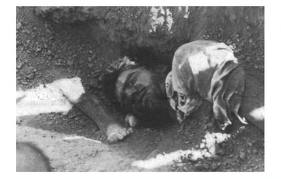
An iconic image from Khavaran near Tehran, where many of those executed are buried.
The summer of 1988 has a special significance in Iran’s tortured history under the Islamic Republic. It marked the height of Iran’s weakened military status in the waning days of its war with Iraq. Iran was also weakened financially, having its coffers dried up as a result of a war ravaged economy with the prospects of social unrest looming for the ruling elite. But more than any of the above economic and geopolitical factors, the summer of 1988 is known for the mass execution of Iranian political prisoners, which at the time, received little international attention and recognition.
Last week, after a quarter of century, the Massacre received its first international recognition as an act of crime against humanity. That recognition came on June 5 from Canada through a unanimous consent of all parties in the Canadian parliament.
Pursuant to an order by Khomeini, approximately nearly 5,000 political prisoners were systematically executed without trial. Many of those in the upper echelons of Iran’s current power structure – from both the conservative and reform camp – were complicit in the massacre. As such the bloodshed met the legal definition of “crimes against humanity” under customary international law, as well as the definition under the Rome Statute of the International Criminal Court.
The driving force behind the Canadian recognition was the Massacre88 Campaign – an Iranian-Canadian group comprised of Iranian-Canadian academics, lawyers, journalists, labour activists and human rights activists. Kaveh Shahrooz is the spokesperson of the Campaign and the primary architect of the motion in the Canadian parliament. According to Mr. Shahrooz, the efforts of the Massacre88 Campaign was modeled after the efforts of the Armenian community to obtain recognition for the 1915 genocide and brought forth by the NDP, a Canadian political party traditionally affiliated with the Canadian left and the labor movement. This was appropriate as many of those executed in 1988 were affiliated with leftist parties.
The Iranian government has consistently denied that the massacre took place and avoided participating in investigations into the killings.